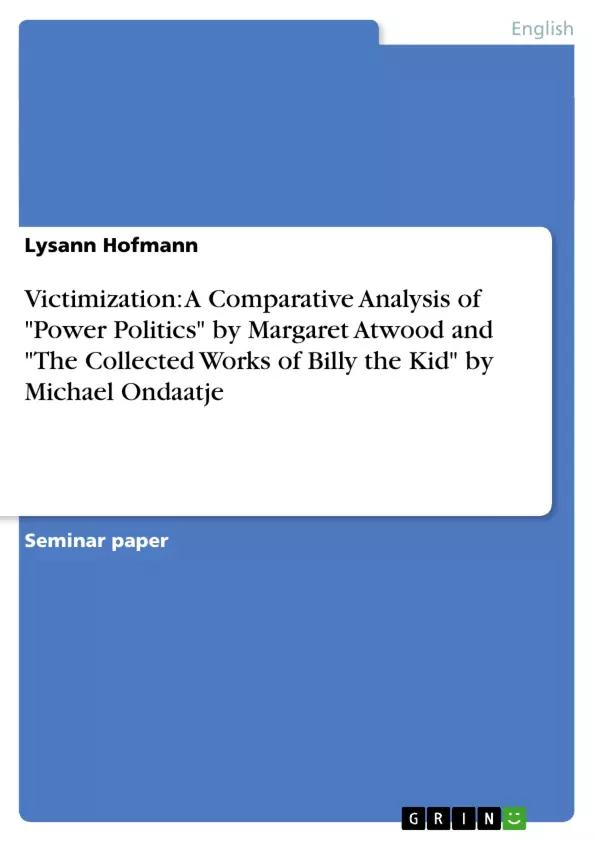Survival- the state of continuing to live or exist, often in spite of difficulty or danger. So, ‘survival’ is defined in the Oxford Advanced Learner’s Dictionary. Following this definition, one have to admit that this state isn’t a very positive one for the people who are in this situation.
In Margaret Atwood’s 'Survival: A thematic guide to Canadian Literature' it is argued that the “single unifying and informing symbol”(31) of Canada is Survival. This idea comes from Canada’s history, where the inhabitants ever had to fight for survival. First, there was wilderness which threatened the life of the first settlers. Later, cultural surviving, which went from the threatened French Canada to the English Canada, was the main point for the inhabitants. So, you can say that the Canadians ever had to fight for survival. Therefore, survival is main subject in Canadian Literature. Atwood leads the reader from this theory to another one which deals with the so-called basic victim positions (which, in her opinion, results from survival as Canada’s symbol). She maintains that ninety per cent of Canadian Literature deals with the problem of being a victim. So, I’d like to mention the four basic victim positions she outlines in her study:
1.) The person denies that he/she is a victim.(36)
2.) The person acknowledges the fact that he/she is a victim, but explains this as an act of Fate, the Will of God, the dictates of Biology, the necessity decreed by History, or Economics, or the Unconscious, or any other large general powerful idea.(37)
3.) The person acknowledges the fact that he/she is a victim but refuses to accept the assumption that the role is inevitable.(37)
4.) The person is a creative non-victim.(38)
Table of Contents
- Survival
- Power Politics
- The Victim
- The Collected Works of Billy the Kid
- The Victim
Objectives and Key Themes
This essay aims to analyze the concept of victimization in Canadian Literature through a comparative study of Margaret Atwood's Power Politics and Michael Ondaatje's The Collected Works of Billy the Kid. The essay explores how the theme of survival, a defining element of Canadian identity, contributes to the portrayal of victimization in both works. The analysis focuses on the four basic victim positions outlined in Atwood's Survival and investigates how the main characters embody these positions.
- Survival as a defining element of Canadian identity
- The concept of victimization in Canadian literature
- Analysis of victim positions in Atwood's Survival
- Comparative study of Power Politics and The Collected Works of Billy the Kid
- The portrayal of characters as victims within the context of their social and historical environments
Chapter Summaries
Power Politics
Power Politics focuses on the relationship between a woman and her husband. The woman, the I-narrator, reveals her emotional struggles and the power imbalance in their relationship. She recognizes herself as a victim, torn between accepting her situation and trying to break free. The essay analyzes her internal struggle and her vacillation between different victim positions, highlighting her attempts to assert herself while simultaneously feeling trapped.
The Collected Works of Billy the Kid
The Collected Works of Billy the Kid presents a historical-legendary figure as a victim of his environment and the expectations imposed upon him. The essay explores how Billy's actions, rooted in the harsh realities of the Wild West, lead him to perceive himself as a victim of fate and societal pressures. The analysis focuses on his belief that men in this environment must be strong and ruthless, leading to his internal struggle and emotional turmoil.
Keywords
The essay primarily focuses on the themes of victimization, survival, and Canadian identity. It explores the concept of victim positions as outlined in Atwood's Survival and analyzes how the main characters in Power Politics and The Collected Works of Billy the Kid embody these positions. The essay also touches upon the influence of social and historical contexts on the characters' perceptions of themselves and their circumstances.
Frequently Asked Questions
What are Margaret Atwood's four basic victim positions?
The positions are: 1) Denying being a victim, 2) Acknowledging it as fate or god's will, 3) Acknowledging it but refusing to accept it as inevitable, and 4) Being a creative non-victim.
How is survival linked to Canadian identity?
Atwood argues that survival is the central symbol of Canada, stemming from a history of fighting against wilderness and cultural threats.
What is the central conflict in "Power Politics"?
It explores the emotional struggle and power imbalance within a marriage, where the narrator recognizes herself as a victim trying to break free.
How is Billy the Kid portrayed as a victim?
In Ondaatje's work, Billy is seen as a victim of the harsh Wild West environment and the violent expectations imposed upon him by society.
What percentage of Canadian literature deals with victimization according to Atwood?
Atwood maintains that approximately ninety per cent of Canadian literature focuses on the problem of being a victim.
- Quote paper
- Lysann Hofmann (Author), 2002, Victimization: A Comparative Analysis of "Power Politics" by Margaret Atwood and "The Collected Works of Billy the Kid" by Michael Ondaatje, Munich, GRIN Verlag, https://www.grin.com/document/23057



